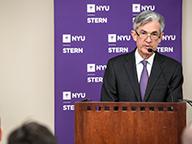Business and Policy Leader Events
—
NYU Stern Hosts 2nd Roundtable on Corporate Political Accountability
—

A collaborative group comprising faculty and deans from business and law schools, as well as other leaders in business, law and the nonprofit sectors, convened at NYU this February to engage in a discussion about “Corporate Political Accountability: The Importance of Educating Future Business Leaders Beyond Citizens United.”
Business and Policy Leader Events
—

A collaborative group comprising faculty and deans from business and law schools, as well as other leaders in business, law and the nonprofit sectors, convened at NYU this February to engage in a discussion about “Corporate Political Accountability: The Importance of Educating Future Business Leaders Beyond Citizens United.”




















